As the global shift toward sustainable transportation continues, electric vehicles (EVs) have become a compelling choice for families seeking eco-friendly, cost-effective, and feature-packed options. In 2025, the market for family-friendly EVs is more competitive than ever, with automakers offering impressive features, extensive ranges, and advanced safety technologies tailored to families. Here, we explore the best EVs for families this year, supported by stats and figures to help you make an informed decision.
Why EVs Are Perfect for Families in 2025
EVs are no longer just about saving the planet. They offer practical benefits that align perfectly with family needs:
- Cost Savings: According to the U.S. Department of Energy, EV owners can save approximately $800 to $1,000 annually on fuel costs compared to gasoline-powered vehicles.
- Safety Features: Many EVs come with advanced driver-assistance systems (ADAS) such as lane-keeping assist, adaptive cruise control, and pedestrian detection.
- Eco-Friendly: EVs produce zero tailpipe emissions, contributing to cleaner air for future generations.
- Convenience: Home charging setups make “fueling” more convenient than ever.
Key Features Families Look for in an EV
When choosing an EV for your family, consider these critical factors:
- Range: A long driving range minimizes range anxiety during road trips.
- Interior Space: Ample seating and cargo room for growing families.
- Safety Ratings: High crash-test ratings and robust safety tech.
- Affordability: Reasonable pricing with available tax incentives.
- Charging Network: Access to fast and reliable public charging stations.
Top EVs for Families in 2025
1. Tesla Model Y
- Starting Price: $49,990
- Range: 330 miles (EPA-estimated)
- Seats: Up to 7
- Key Features: Tesla’s full self-driving capability (optional), a spacious interior, and access to Tesla’s Supercharger network.
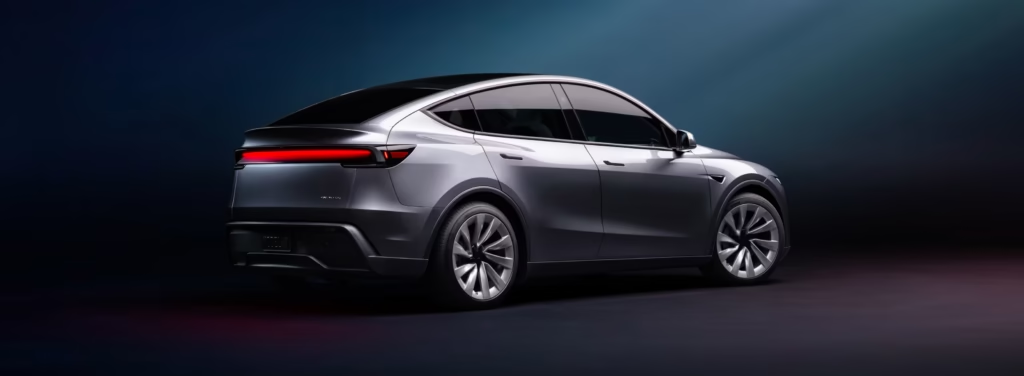
The Tesla Model Y continues to dominate the family EV market with its impressive range, cutting-edge technology, and optional third-row seating. The 15-inch touchscreen offers seamless entertainment for long drives, while over-the-air updates ensure the latest features.
Pros:
- Impressive range of 330 miles (EPA-estimated), making it ideal for long trips.
- Spacious interior with optional third-row seating, accommodating up to 7 passengers.
- Access to Tesla’s extensive Supercharger network for fast and reliable charging.
- Over-the-air updates that continuously improve vehicle features.
- Advanced technology, including Tesla’s optional full self-driving capability.
Cons:
- High upfront cost compared to some competitors.
- Limited space in the third row, which may be unsuitable for adults.
- Minimalist interior design may not appeal to everyone.
- Reliance on touchscreen controls can be distracting for some drivers.
2. Hyundai Ioniq 7
- Starting Price: $56,000 (estimated)
- Range: 300 miles
- Seats: 6-7
- Key Features: Augmented reality (AR) head-up display, spacious cabin, and bi-directional charging.

Pros:
- Impressive Range: Equipped with a 100-kWh battery, the Ioniq 7 is expected to offer a driving range of approximately 300 miles on a single charge, making it suitable for long-distance travel. Key Hyundai
- Fast Charging Capability: The vehicle is compatible with 350 kWh DC fast-charging stations, allowing for rapid charging and reducing downtime during trips. Key Hyundai
- Spacious Interior: Designed as a three-row SUV, the Ioniq 7 provides ample space for passengers and cargo, catering to families and those needing extra room. Key Hyundai
- Advanced Safety Features: The Ioniq 7 is anticipated to include a suite of driver-assist technologies, such as lane-keeping assist, blind-spot monitoring, and automatic emergency braking, enhancing overall safety. MetroWest Hyundai
- Modern Design: The SUV is expected to feature a sleek, aerodynamic design with signature Parametric Pixel lights, offering a unique and engaging visual appeal. Key Hyundai
Cons:
- Pricing: With an estimated starting price in the mid-$50,000 range, the Ioniq 7 may be considered expensive compared to some other electric SUVs on the market. MetroWest Hyundai
- Availability: As a new model, the Ioniq 7’s availability may be limited initially, potentially leading to longer wait times for delivery.
- Charging Infrastructure: While the Ioniq 7 supports fast-charging, the availability of compatible charging stations may vary by region, which could affect convenience for some users.
- Competition: The electric SUV market is becoming increasingly competitive, with several manufacturers offering similar features and performance, which may influence consumer choice.
The Ioniq 7 is Hyundai’s bold entry into the family EV space, offering futuristic design and top-tier comfort. Its bi-directional charging feature allows families to power devices or even their homes during outages.
3. Kia EV9
- Starting Price: $54,500
- Range: 310 miles
- Seats: 7
- Key Features: Highway Driving Pilot (HDP), reclining second-row seats, and a dual 12.3-inch display.
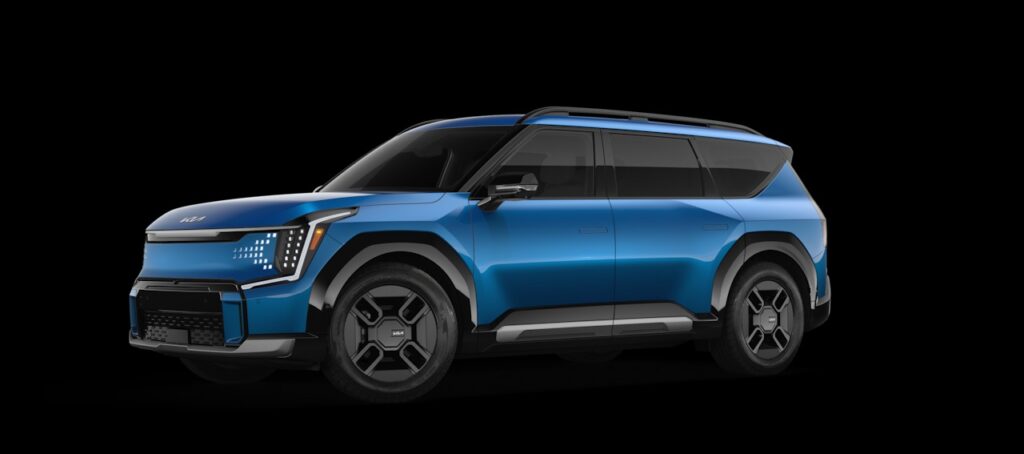
Pros:
- Spacious Interior: The EV9 offers ample space, comfortably accommodating up to seven passengers with flexible seating arrangements. The Times & The Sunday Times
- Advanced Technology: Equipped with modern tech features, including a comprehensive infotainment system and driver-assist technologies, enhancing both convenience and safety. The US Sun
- Impressive Range: With a range of up to 349 miles, the EV9 is suitable for long-distance travel, reducing the need for frequent charging stops. The Times & The Sunday Times
- Fast Charging: The vehicle’s fast-charging capability allows for quick recharging, minimizing downtime during trips. Kia
Cons:
- Size and Maneuverability: The EV9’s large size may affect its agility, making it less maneuverable in tight spaces compared to smaller SUVs. The Times & The Sunday Times
- Price Point: Starting at over $54,900, the EV9 is positioned at a higher price point, which may be a consideration for budget-conscious buyers. The US Sun
- Complexity of Features: Some advanced features, such as the swiveling second-row seats, may be complex to operate and could require a learning curve
Kia’s EV9 offers the perfect blend of technology and practicality. With its roomy interior and advanced driver-assistance features, it’s designed for families seeking luxury and utility.
4. Volkswagen ID. Buzz
- Starting Price: $45,000
- Range: 260 miles
- Seats: 5-7
- Key Features: Retro-inspired design, flexible seating configurations, and ample cargo space.
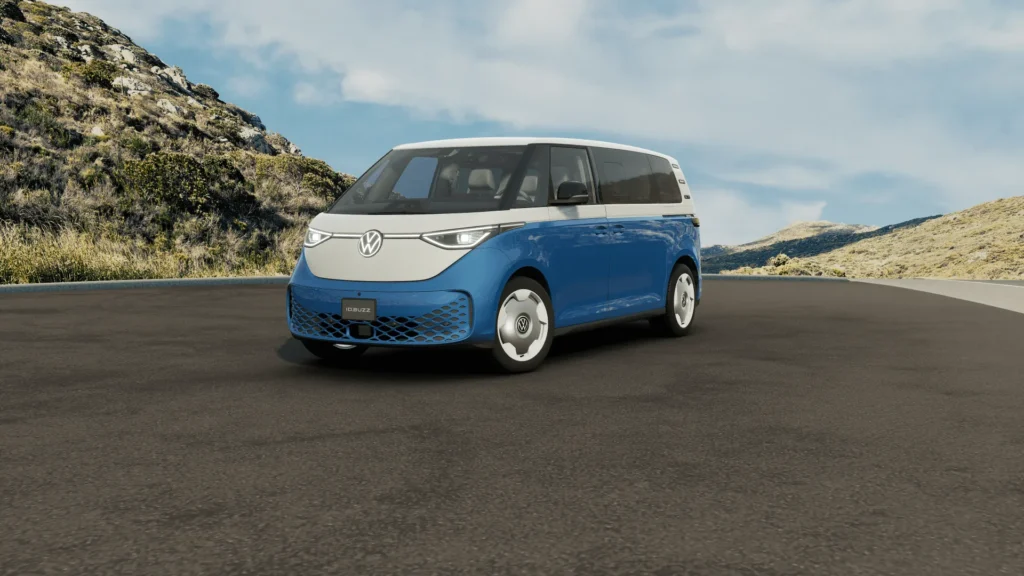
Pros:
- Nostalgic Appeal: The ID. Buzz’s design evokes fond memories of the classic Microbus, appealing to those who appreciate its heritage. WSJ
- Spacious Interior: The vehicle offers a roomy cabin with flexible seating arrangements, making it suitable for families and group travel. Edmunds
- Advanced Technology: Equipped with modern tech features, including a comprehensive infotainment system and driver-assist technologies, enhancing both convenience and safety. VW
Cons:
- Limited Range: The ID. Buzz has a highway range of approximately 234 miles, which can decrease at higher speeds, potentially requiring more frequent charging during long trips. WSJ
- Price Point: Starting at $59,995, the ID. Buzz is positioned at a higher price point, which may be a consideration for budget-conscious buyers. VW
- Visibility: Some reviewers have noted that the thick roof pillars can slightly obstruct visibility, particularly when changing lanes. WSJ
The ID. Buzz brings nostalgia with a modern twist. It’s perfect for families who value style and practicality, offering a roomy interior and innovative features like a digital cockpit.
5. Rivian R1S
- Starting Price: $78,000
- Range: 316 miles
- Seats: 7
- Key Features: All-wheel drive, 0-60 mph in 3 seconds, and a luxury cabin.
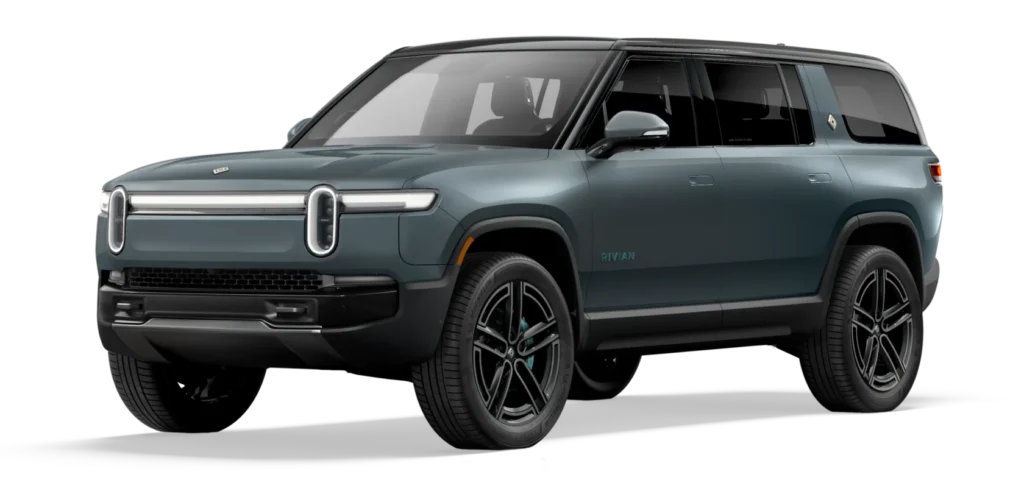
Pros:
- Impressive Performance: The R1S offers quick acceleration and strong off-road capabilities, making it versatile for both urban and adventurous driving.
- Spacious and Luxurious Interior: The cabin provides ample space and high-quality materials, ensuring comfort for all passengers.
- Advanced Technology: The SUV is equipped with modern infotainment systems and driver-assistance features, enhancing convenience and safety.
- Strong Towing Capacity: With a towing capacity of up to 7,700 pounds, the R1S is suitable for hauling trailers, boats, or other heavy loads. Edmunds
Cons:
- High Starting Price: The R1S starts at $77,700, which may be considered expensive compared to some competitors. caranddriver.com
- Limited Availability: As a newer manufacturer, Rivian’s production and delivery capabilities are still scaling, which may affect availability and wait times.
- Charging Infrastructure: While Rivian is developing its own charging network, the availability of charging stations may be limited in certain areas, potentially affecting long-distance travel plans.
For adventurous families, the Rivian R1S is the ultimate choice. Its rugged design, off-road capabilities, and luxury interior make it ideal for road trips and outdoor adventures.
Incentives for Families Buying EVs in 2025
Government incentives make switching to an EV even more appealing:
- Federal Tax Credits: Up to $7,500 for eligible vehicles.
- State Rebates: Additional rebates in states like California, New York, and Colorado.
- Utility Discounts: Many utility companies offer discounts for installing home charging stations.
Frequently Asked Questions (FAQ) – The Best EVs for Families in 2025
What are the key factors to consider when choosing an EV for a family in 2025?
When selecting an electric vehicle (EV) for a family in 2025, consider the following key factors:
Seating Capacity: Look for an EV that comfortably accommodates your family size. Many family-friendly EVs offer seating for five to seven passengers.
Range: A longer range ensures you can take longer trips without worrying about charging frequently. Aim for an EV with at least 250-300 miles of range on a single charge.
Cargo Space: Ample cargo space is essential for storing strollers, groceries, and sports equipment.
Safety Features: Advanced driver-assistance systems (ADAS) like lane-keeping assist, adaptive cruise control, and emergency braking are crucial for keeping your family safe.
Charging Network: Access to fast charging stations is important for convenience, especially on long trips.
Which EVs are the best for families in 2025?
The top family-friendly EVs for 2025 include:
Hyundai Ioniq 7: A large electric SUV with a stylish design, ample space for passengers and cargo, and a strong range, making it ideal for family trips.
Tesla Model X: A spacious electric SUV with advanced Autopilot features, a long range, and up to seven seats.
Ford Mustang Mach-E: A versatile SUV offering excellent range, a stylish design, and a comfortable interior.
Rivian R1S: A luxury electric SUV with impressive off-road capabilities and seating for up to seven passengers.
Volkswagen ID. Buzz: A modern take on the classic Microbus, offering a nostalgic design and family-friendly features like spacious seating and advanced tech.
What is the average range of EVs suitable for families in 2025?
Family-friendly EVs in 2025 typically offer ranges of 250-400 miles on a single charge, depending on the model and battery configuration. This ensures families can travel longer distances without frequent charging stops. For instance, the Rivian R1S offers up to 400 miles, while the Tesla Model X provides around 340 miles of range.
Are there any EVs that offer third-row seating for larger families?
Yes, several EVs in 2025 offer third-row seating, ideal for larger families:
Tesla Model X: Offers up to seven seats, making it suitable for larger families
Rivian R1S: With seating for up to seven passengers, this is a great option for those who need extra space.
Hyundai Ioniq 7: Expected to provide flexible seating for up to seven passengers, with ample cargo room.
How long does it take to charge an EV, and how does that impact family road trips?
Charging time can vary based on the charging method:
Level 1 Charging (Standard Outlet): This can take 20-40 hours, which is impractical for road trips but can be used for overnight charging at home.
Level 2 Charging (Home or Public Charging Stations): Typically charges an EV in 4-10 hours, making it great for overnight charging or quick stops at public stations.
DC Fast Charging: This can recharge an EV to 80% in around 30 minutes, making it perfect for family road trips. Many public stations offer DC fast charging.
What is the price range for family-friendly EVs in 2025?
The price of family-friendly EVs in 2025 can vary significantly based on the model and configuration:
Hyundai Ioniq 7: Expected to start around $55,000.
Tesla Model X: Starts at around $90,000 for the base model.
Ford Mustang Mach-E: Starts at approximately $45,000, making it more affordable.
Rivian R1S: Begins at around $77,000.
Volkswagen ID. Buzz: Estimated starting price of $59,995.
Are EVs safe for families in 2025?
Yes, EVs for families in 2025 come equipped with advanced safety features, including:
Driver-assistance systems: Features such as lane-keeping assist, adaptive cruise control, and automatic emergency braking.
Crash test ratings: Many of the top family EVs have earned high safety ratings from organizations like the NHTSA (National Highway Traffic Safety Administration) and IIHS (Insurance Institute for Highway Safety).
Robust build quality: EVs like the Tesla Model X and Rivian R1S are built with strong safety structures, ensuring durability in the event of an accident.
Can EVs be used for towing family trailers or boats?
Yes, many family-friendly EVs in 2025 are equipped with impressive towing capacities:
Rivian R1S: Can tow up to 7,700 pounds, making it ideal for family trailers and boats.
Tesla Model X: Offers towing capacity of up to 5,000 pounds.
Ford Mustang Mach-E: Towing capacity of up to 1,500 pounds for certain configurations.
What are the environmental benefits of choosing an EV for my family?
By driving an electric vehicle, families can:
Reduce carbon emissions: EVs have zero tailpipe emissions, reducing your family’s carbon footprint.
Lower operating costs: EVs are more efficient and cost less to maintain compared to traditional gasoline vehicles.
Support renewable energy: Many EVs can be charged using clean energy sources, further enhancing their environmental benefits.
.
Note: Image credits goes to respective manuafacturers
Roadscoop editorial a team of is a passionate automotive enthusiasts and industry experts dedicated to bringing the latest news, trends, and insights to RoadScoop.com readers. With a keen eye for innovation and a deep understanding of the automotive world, we covers everything from car reviews and maintenance tips to industry updates and market trends.

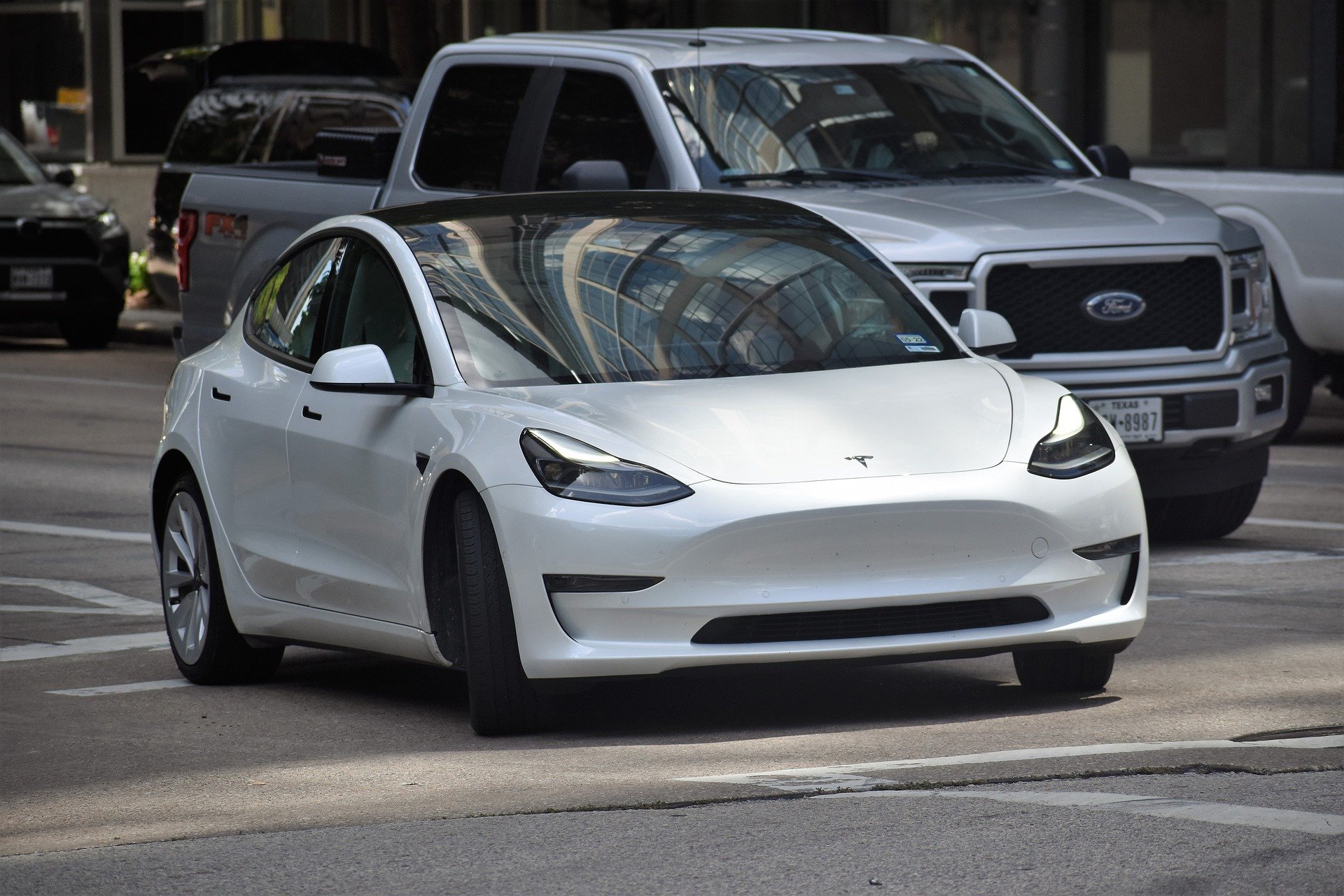
Leave a Reply